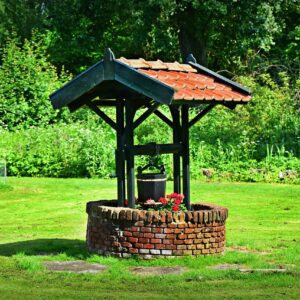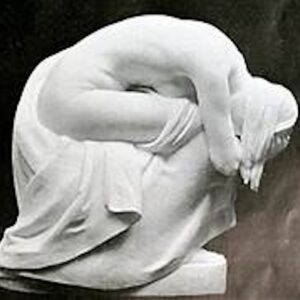One of my favorite Shakespeare sonnets is #73:
That time of year thou mayst in me behold When yellow leaves, or none, or few, do hang Upon those boughs which shake against the cold, Bare ruin’d choirs, where late the sweet birds sang. In me thou see’st the twilight of such day As after sunset fadeth in the west, Which by and by black night doth take away, Death’s second self, that seals up all in rest. In me thou see’st the glowing of such fire That on the ashes of his youth doth lie, As the death-bed whereon it must expire, Consum’d with that which it was nourish’d by. This thou perceiv’st, which makes thy love more strong, To love that well which thou must leave ere long.
I sense that this speaker and the person he’s addressing have a history. He’s saying, “Look at me now and this is what you’ll see.” The stress in line 1 is on the second word “time,” but I also hear a stress in “That,” the sonnet’s point of departure, that time, not some other.
“Behold” is to see or look, but more than that. It means to observe a thing or a person, especially a remarkable or impressive one. Shakespeare places this word at the end of the line and stresses the syllable “—hold,” a choice that has a connection to the word’s etymology. “Behold” derives from the Old English bihaldan, from bi- “thoroughly” + haldan “to hold.” Parallel Germanic words mean “maintain, retain”; the notion of “holding” by seeing or looking is found only in English.
“Yellow”: the leaves have transitioned to late fall or early winter. There’s a group or mass of them, and next a stark contrast, “none,” and then a reconsideration—there might be a few. Modern editions insert a comma after “few,” but in the 1609 Quarto text, there is no comma, and the result is that the pace is quickened—only to be halted by the crisp verb “hang,” which completes itself as we move to the next line, “hang / Upon,” the stress falling where we expect it, on the second syllable. Shakespeare has structured the line to represent the action of our eyes when momentarily we see things or think we do, become aware of their absence, and then realize that there are some we had overlooked.
The boughs shake from chilly weather. But that’s not quite accurate, not what the phrasing implies. “Those boughs,” those not here but there, shake “against” the cold, as though in resistance, even defiance. “Bare” is tricky: how can this sight be bare if it consists of yellow leaves? “Choirs” refers to the part of a church where services are sung, evoking the singers who once were in them, “the sweet birds” whose voices are no longer heard.
It’s not “Bare choirs,” however, but “Bare ruined choirs,” and the stress is regular, accenting the choirs’ ruin-ation. Once more, the etymology is illuminating. “Ruin” derives from Middle English, in the sense, “collapse of a building,” from Old French ruine, from Latin ruina, ruere , “to fall.” “Ruined” connotes a building or site reduced to decay, collapse, disintegration, irreparably damaged or harmed. We could voice “ruin’d” as a single syllable, but the meter requires two, and two is better anyway because it obliges us to face and absorb the devastation.
The line in Q is “Bare rn’wd quiers, where late the sweet birds sang.” “Quiers” is the spelling for quires, that is, “choirs,” as modern editors render it. But how should we pronounce “rn’wd”? Is the emendation “ruin’d” correct?
It’s a pleasure to reread and analyze this first quatrain, looking at it and listening to it, the puzzles it generates and the questions it raises, and I am tempted to proceed to the rest of the sonnet. But in this post, I have another purpose, and that’s to quote and pay tribute to William Empson’s interpretation of the line about “choirs” in chapter 1 of his 1930 masterpiece of literary criticism, Seven Types of Ambiguity:
The fundamental situation, whether it deserves to be called ambiguous or not, is that a word or a grammatical structure is effective in several ways at once. To take a famous example, there is no pun, double syntax, or dubiety of feeling, in
Bare ruined choirs, where late the sweet birds sang,
but the comparison holds for many reasons; because ruined monastery choirs are places in which to sing, because they involve sitting in a row, because they are made of wood, are carved into knots and so forth, because they used to be surrounded by a sheltering building crystalized out of the likeness of a forest, and colored with stained glass and painting like flowers and leaves, because they are now abandoned by all but the grey walls colored like the skies of winter, because the cold and Narcissistic charm suggested by choir-boys suits well with Shakespeare’s feeling for the object of the Sonnets, and for various sociological and historical reasons (the Protestant destruction of monasteries; fear of puritanism), which it would be hard now to trace out in their proportions; these reasons, and many more relating the simile to its place in the Sonnet, must all combine to give the line its beauty, and there is a sort of ambiguity in not knowing which of them to hold most clearly in mind.
Sentences like this, the second one so amazingly long, showing a reader at work, trying to figure out an effect of language: I remember the thrill that Empson’s voice and approach gave me half a century ago. That’s what it’s like to be really interested in Shakespeare, with curiosity, focus, and persistence, and that’s what I wanted to learn to do. From then on, whenever I read a poem by Shakespeare or anyone else, Empson was my guide, interlocutor, and companion.
He was brilliantly, idiosyncratically English—I knew I couldn’t sound like him. But his brisk and nimble activity of mind, the sheer and serious fun he took in analyzing how meanings are fashioned and his pleasure in finding words for his responses and in shaping sentences for them—this was something I could strive for and, with effort and practice, perhaps someday could come close to.
Some of you may have experienced moments as revelatory as this encounter with Empson was for me. It’s luminous when it happens, this contact with a bracing intelligence and imagination, like a conversion, an event that changes us and that we will always remember. It motivates us to become better critics and teachers, more agile and adept, eager to share with others the discoveries we have made about the complex meaning-making of literature.
William E. Cain is Mary Jewett Gaiser Professor of English at Wellesley College, where he enjoys teaching courses on Ralph Waldo Emerson, Henry David Thoreau, and other American writers. His recent publications include essays on Edith Wharton and Ernest Hemingway.





